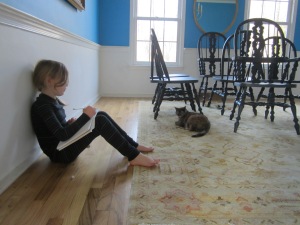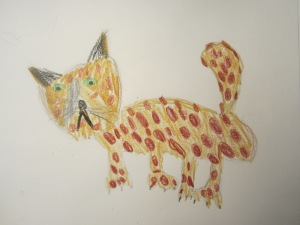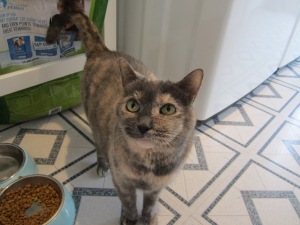Sometimes life taps you on the shoulder and whispers, take notice, this is important.
On Christmas Eve, my husband took our cat Mimi to the vet. She had a suspicious lump on the side of her face and a weepy eye. Looking back, it’s clear that this was not going to end well, but I was hopeful, or perhaps denial is the more appropriate word. Shortly after he sent me a text that sank my stomach to my knees. Call me right away.
I sobbed quietly in the kitchen while he explained the vet’s explanation. My children sat unaware in the other room. Our two cats had been our first “babies,” now beloved by our actual babies more than us. Changing diapers and raising humans rubbed the shine off our feline affections, I’m sorry to say. However, nothing like a terminal diagnosis to release a dam of guilt and love.
In furtive whispers we decided to wait before telling our children, especially our daughter who is six and two thirds (her words) and highly sensitive. There was an off chance that this was a non malignant lump. We decided to make an appointment for surgery. I think we both knew in our hearts euthanizing might be the more humane (not to mention practical) course, but neither of us was willing to make that call despite years of complaining about cat litter and hairballs.
On Sunday after a weekend celebration filled with family, laughter, and of course gifts, my husband took our daughter aside and told her the news. I heard her cries from where the kitchen and felt the sting of her pain, a layer of her innocence peeled back, at this first intimate exposure to disease and death.
She asked why, repeatedly, as she cried and we tried to answer her questions honestly, but also carefully because our girl suffers from anxiety, especially regarding illness. Not that surprising given she has celiac disease, but more than the average kid. We walked the line of truth on wobbly legs. We did our best, which ultimately, is all you can do as a parent, and really, as a human being.
At one point my husband said, “Death is an important part of life.” This phrasing seemed to agitate her. “Why important,” she asked looking confused.
I put my arm around her and pulled her close. “Death is part of life,” I said, removing the adjective before adding another. “And it’s very sad.”
After she dried her eyes, my husband asked if she wanted to spend the afternoon with Mimi, but she said no. Already I saw her edging back, in fear, but also as a form of self-protection. Adults do this, too. I saw it happen to my mother when she was diagnosed with multiple sclerosis at age forty. Some friends dropped back so far they disappeared. When she was dying, eighteen years later, I watched certain people approach her fearlessly, weeping at her bedside, resting their head against hers, while others remained on the periphery of the room, watching from a distance.
There is no right or wrong way to behave in the face of death. But my husband and I understood that this first introduction, the way we acted and reacted in the eye of this oncoming storm, would shape our daughter. At this point, death was a possibility not a certainty, so we didn’t push her. It was her idea to drive to Philadelphia and visit The Franklin Institute, one of our favorite museums. I asked her why even though I already knew. I already knew.
To see the heart, she said.
Oh, the heart. I hid my tears behind a hand as I thought about hearts, that precious fist shaped organ, the quiet steady force of life. When I think about hearts I always think of my mother’s, how hers beat on even after her lungs failed. I was sitting at her bedside when she stopped breathing. Her face turned blue, but most surprisingly, she smiled.
Then, with a sharp gasp the smile disappeared and she was back. We later learned later it was because her heart was so strong, so young. A few days later, it stopped, and she died peacefully in her sleep. But I will always remember how it didn’t want to quit, and it seemed a fitting metaphor for such a loving woman.
We agreed to drive to the museum, all of us nodding our heads in unison. It’s a good idea, I said. Better to leave the house and not mope around. Besides, poor Mimi would be better served sleeping peacefully than being pursued by our worried children.
It was overcast, the kind of day when the passage of time is elusive, the sky knitted thick with clouds. I put away my phone and took out my notebook. I wrote about the sky and my daughter. I wrote about the sun shining like a pale coin, and how it seemed to struggle through the clouds, elbowing its way out before falling back again.
We had a nice day. We walked through the heart twice, its methodical pounding amplified in our ears. There’s the left ventricle, I pointed out to my son who held my hand and walked ahead of me. His big sister ran through, already an expert at the steep stairs and all the twists and turns. I called out to her, wait for us, I said, not wanting to lose sight of her. Often she’s five steps ahead of me, in the heart and in life. I’m learning to let go bit by bit, but it’s hard.
The next day Mimi took a turn for the worse. She vomited in a sudden and violent way. There was blood all over the floor. My husband and I looked at each other horrified, knowing what that meant. For once I was grateful for the endless episodes of Angelina Ballerina. It gave us time to clean up the blood, to compose ourselves. To prepare for the next conversation.
Our girl took it hard. I wept beside her as I witnessed this next level of understanding. Later, though, I realized how lucky we are, how lucky she was that this first brush with death was an animal’s, as dear as she was to us, and not a parent or sibling. I knew it could be much, much worse.
But still.
The next day we spent inside, biding our time. The appointment with the vet was at 4:30. For the first time in days, my daughter approached Mimi. She was still cautious, but offered to sit with her to “keep her company.” I gave her a pad of paper and she sketched a portrait. She wanted to get Mimi just right and I think she did.
When it was time to say goodbye, I was a wreck, but my dear daughter was composed and full of compassion. She stayed in the play room with her father when he put Mimi into the carrier. She offered to walk Mimi to the car, crouching low so the cat could see her face and “not be afraid.” I stood at the window stifling my sobs, so proud and so heavy hearted.
Rest in peace sweet kind Mimi, always the gentlest of cats, with the most beautiful coat of caramel striped fur I’ve ever seen. We will miss you.
A cat of many names, given upon adoption as Nome
Shortened to Noemi, and renamed by our daughter, Mimi
Born 2005-Died 2014
Have you had to deal with a pet or family member’s death with your child? How did you handle it? Were there any books about grief that seemed to help?





What a beautiful moment for your family. I’m sorry for your loss. We have had 2 pet deaths and 2 family deaths (grandparent and great grandparent) that my children have been through. My daughter still talks about our dog, Lena, who died when she was 4. Almost every personal narrative she’s had to write in school is about the death of a pet–her way of processing, I’m sure. The book The Tenth Good Think About Barney by Judith Viorst is a good one for going through death. My sister said once that one of the benefits of having a pet is to teach kids about death. It’s hard, but as you said, it’s a part of life. Love and hugs to you guys.
LikeLike
Thank you so much Caitlin. I can’t imagine how challenging that was for your family, 2 family deaths and 2 pets. It makes sense that your daughter is processing all of it – and also how great that she IS feeling it and writing about it. Thank you for your recommendation, I will look for it.
LikeLike
dana – so beautiful and your words both gentle and so wise. we suddenly lost our cat, Lou, earlier this year and it hit my daughter with equal harshness around the reality of life and death — as well as her processing their relationship and his place in her life and heart.
holding you all close as you move through the next steps and stages of your family journey – xo
LikeLike
Oh, I’m sorry for your loss of Lou. It is so hard watching our children process these deep, dark, and inevitable lessons. Thank you for reading my post and for your kind thoughtful words.
LikeLike
Oh goodness. Sobbing here. So sorry about your sweet Mimi. We lost our dog three years ago and it was truly terrible. Going through your own sadness while dealing with your children’s is super tough because you are right- there is so much to teach and to learn in these moments. It sounds like you did everything beautifully. Your daughter’s portrait is just perfect- what a lovely way to celebrate your sweet kitty.
LikeLiked by 1 person
Thank you Stacey, for all these kind words, you are so sweet. I’m very sorry about the loss of your dog.
And oh my, YES, it is so hard to feel my own grief and try to temper it in front of my children. I want them to know it’s okay to cry and feel, but I also don’t want to overwhelm them with more sadness than they can handle. What a balance indeed.
LikeLiked by 1 person
Aw, Mimi was beautiful.
It’s so fascinating how they do handle death. And boy do I remember the heart at Franklin Institute! We went on a field trip when I was a kid. I was much more excited for it than I was for the dizzying IMAX theatre.
My first death was my father and it was sudden. For my daughter, our ancient husky passed away but she was only a year old. My grandmother died over the summer and she was 100-years-old. She passed away peacefully and after a full life. Seemed so easy to explain to my then four-year-old. Easier.
LikeLike
Thank you Tamara. Oh that heart is the craziest, isnt’ it?! My dad told me he went through it as a kid, which is just wild.
I’m so very sorry that your first death was your father. That breaks my heart hearing that. My mother died when I was 32 and in a strange way, I feel like I haven’t aged since then (my reflection in the mirror says otherwise however). There is something that stops inside you when a close loved one dies, or at least, that’s how it feels.
Ancient dogs to babies and 100 year old (wow!) grandmothers make more “sense” in a practical way (not necessarily emotional of course), and are easier to explain, at least to children, but still. It all takes a toll.
LikeLike
So sorry for your loss Dana 😦 Your daughter’s reaction reminded me of my own when I was about her age (maybe a little older) when we lost our beloved labrador Ben, who died of old age. I still think of him to this day. Having been raised by my grandparents I had to learn to ‘deal’ with loss from a young age – therapy certainly helped and after my dad’s sudden passing all of Elizabeth Kubler Ross’ books helped too.
LikeLike
Thank you Yolanda for such a heartfelt response. We told our daughter she would always remember Mimi. There is something about that first loss that remains. I’m terribly sorry that you had to deal with such big loss at such a young age. Thank goodness for therapy and books. It’s interesting, when my mom died I couldn’t read any books about death directly, but I read a lot of introspective nonfiction and journaled nonstop.
LikeLiked by 1 person
I’m crying. Your daughter sounds a lot like my youngest son. He feels things so deeply. We lost our cat (our “first child”) then, a few years later, we got a kitten. We were all so attached to her and she died a few months after we got her. We were devastated but I can’t describe the crying from my son. It was horrific. I’m sorry I have no advice and I am so sorry for your loss. There are pets and there are animals who are part of your family–furchildren. Mimi sounds like the latter. I love your daughter’s courage to sit with Mimi (and draw a portrait).
LikeLike
Oh Sarah, those deep thinking children just cut up my heart into pieces! My girl is SO sensitive. Even more than I was/am. It’s painful to watch and yet my role is to be her witness and support, all the while hoping I won’t fall down with sadness.
I’m so sorry about your terrible loss with your cat and then kitten! That is unbelievably sad, as is imagining the grief of your tender hearted son. There is no advice, I know. Sigh. We just all do our best.
I was so proud of her for drawing that lovely portrait and how she seemed to rise up in some super mature way toward the very end.
LikeLike
What a beautiful cat. The cuddles never last long enough, do they? Sorry for your loss.
LikeLike
Oh, thanks so much, I really appreciate this.
LikeLike
OH no! I’m sorry to hear this, Dana. I think you handled it perfectly. We don’t have any pets, but have dealt with some grandparent and great-grandparent deaths. It’s so hard for the kids to understand. I think that goes for adults too sometimes. Including me! It’s hard to accept the permanence of it all.
LikeLike
Thanks so much Nina, I can imagine how terribly difficult it is dealing with grandparents passing away, especially if one of the parents is in mourning. It’s very hard to balance your own sadness in the face of your children’s feelings. And I agree about it being so hard to accept the permanence. That is something that took me quite a while to “get” when my mom passed away.
LikeLike
I am so sorry for your loss, Dana. The questions about life and death are so difficult to navigate. My daughter gravitates toward the intense and often asks questions about dying that I am not ready to answer. I am not certain that I am equipped to deliver responses that resonate with her, because truthfully, I am attempting to wrap my head around it too. The transience is so hard to accept for both adults and children. xo
LikeLike
Thank you Rudri, as you stated, it’s terribly hard to talk to children about death. It’s a real struggle for me because I honestly don’t know what I believe happens after. Years ago I stumbled my way through a “heaven” discussion with my daughter (then about 4, so she probably doesn’t remember) regarding my mother’s death. It just seemed easier to say something that cushioned the finality of things, but now, if pressed by her, I think my response would be more ambiguous.
LikeLike
Pingback: The Power of Poetry | writing at the table
I’m sorry for your loss.. I don’t really know how I would broach the topic of death with a child. I haven’t had to, yet… My friend told me her three year old has been asking a lot about death and what it means and it’s so hard for her to come up with an answer. I had all kinds of great ideas for her… At least they were great in my mind. When I tried to say them they sounded RIDICULOUS. Like, “Death is when you’re not alive anymore.” Huh!? Or, “All living things die.” LAME!!! I really don’t know what I will do when my almost three year old asks about death.
LikeLike
Thank you so much Pam. As far as talking about death to kids, it’s hard… luckily there are lots of resources online to help, that’s what I used after I tried to wing it when my daughter was 3 – and it was a total disaster! I realized I needed to do more thinking before I spoke, because if I hadn’t worked out what it meant, how could I explain anything to a child? Luckily, she doesn’t remember 🙂
One good piece of advice I got online was to say, “I don’t know” when appropriate. It’s honest and perhaps the most true thing anyone can say with certainty about what happens next. Anyway, I hope it’s many, many years before you have to explain this to your child.
LikeLiked by 1 person
Beautiful writing.
LikeLike
Thank you so much!
LikeLike